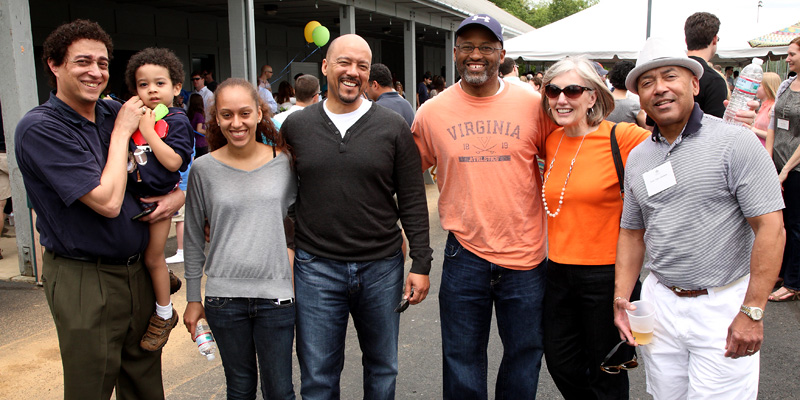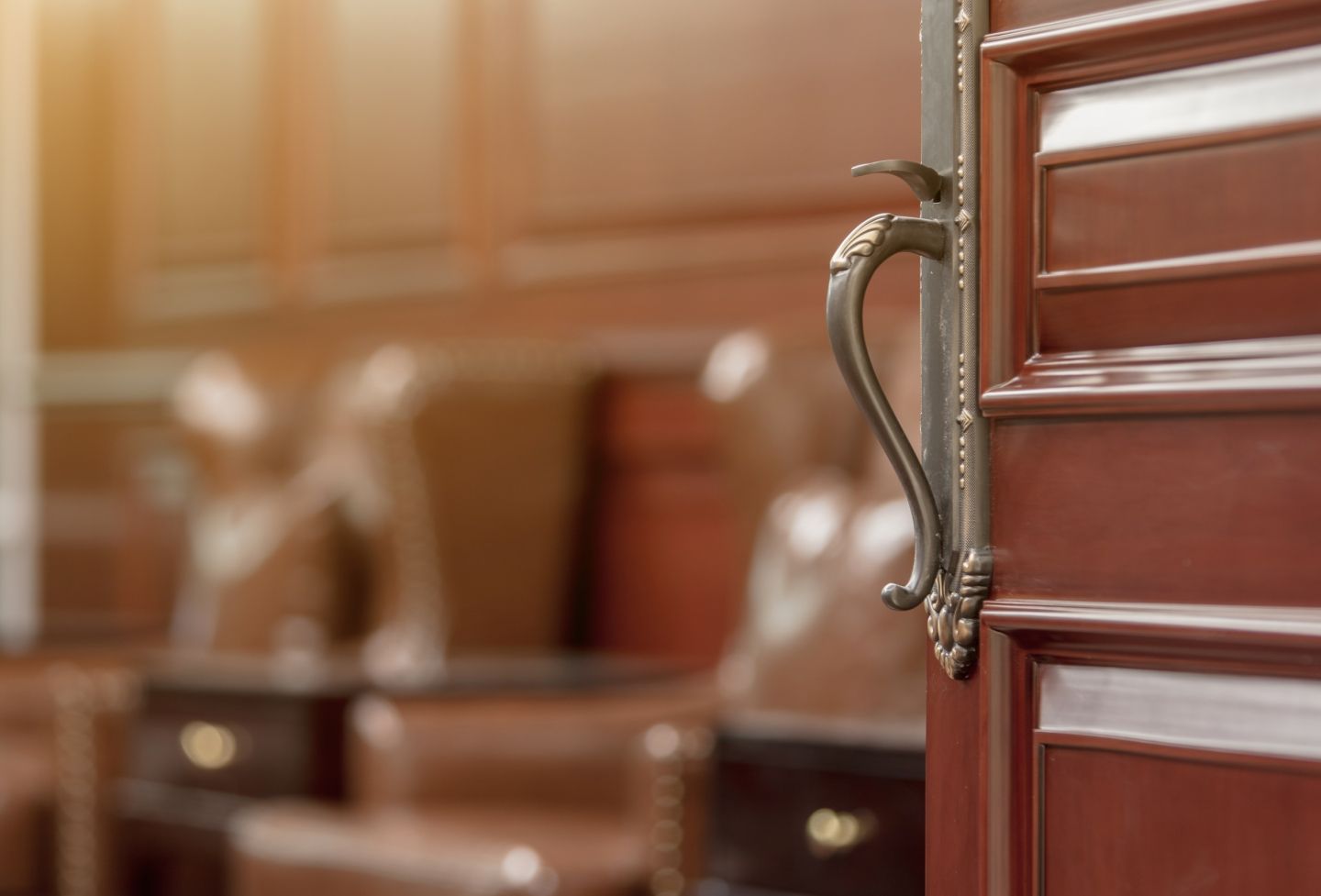Judge Eric C. Taylor ’88 sits in front of a green screen at his computer in his chambers and at home now instead of at the helm of a courtroom, but his work has never been more important.
The University of Virginia School of Law graduate is the presiding judge of the Los Angeles Superior Court — the largest unified trial court in the United States, with 39 courthouses holding 600 courtrooms. He oversees a budget of nearly a billion dollars and 4,800 employees, including just under 600 bench officers. The court serves nearly 10 million Californians.
Part of Taylor’s job is to ensure court operations run smoothly, which has presented a sizable challenge during the pandemic. When he was elected presiding judge in October 2020, shortly after COVID-19 first struck, he promised to “restore safe access to justice.” Since his terms began as assistant presiding judge in 2020 and then presiding judge in January 2021, all the courtrooms have been outfitted to be remotely accessible. The court also launched LACourtConnect, an online portal that Taylor said is “a model” for other courts across the nation. The site allows for online scheduling of court hearings and checking the status of cases, and serves as a portal to access online hearings — with participants getting plenty of reminders so they don’t miss court dates. The remote system and LACourtConnect have allowed for over a million online appearances to date and counting.
“That was a huge investment that is paying great dividends,” he said. “We were forced to quickly adapt under COVID, becoming not only virologists, but forced to rethink the definition of access to justice, remaining aware that many of the most vulnerable lack access to technology.”
Taylor added that leveraging technology has helped in his goal of making the court and the practice more environmentally sustainable and financially efficient.
“We have fewer [lawyers] burning gas while sitting in traffic and parking, and fewer billing for waiting in the courtroom. We’ve transformed the way that we’re doing business throughout the practice of law.”
Now at the midway point in his two-year term, Taylor has had to balance public health and the ongoing business of the court throughout. He recently gave the order for civil and criminal trials to recommence, after some stops and starts “during ebbs and surges.” He estimates there are more than twice as many criminal preliminary hearings waiting to take place than usual, and about a 30% increase in civil case inventories due to pandemic backlogs. Those numbers would be even more overwhelming had the court not launched a robust settlement program, with much of the negotiation taking place online.
“We’re trying to manage our resources with every wave of COVID, and I think our supervisors, bench officers and employees have really been responding well,” he said.
A typical day for Taylor includes being on video calls and responding to emails from the court’s 12 districts, while managing six disciplines ranging from complex civil to family law, felonies and traffic court.
“My job is 24-7 now. The court built an office in my house and gave me a shiny new iPhone, which I thought was really cool until I realized, well, that’s so you can work at midnight too,” he said. “This job has been extremely exhausting but rewarding at the same time.” Now, he might “appear” at five different places on the same day, and his calendar is filled with meetings with bar leaders, associations, fellow judges and staff.
Taylor’s path to the bench began as a youth with the A Better Chance program, which helped him earn a scholarship to the Cate Preparatory School in Santa Barbara. Though he became a first-generation college student when he matriculated at Dartmouth, his parents had successful professional careers. His mother, Joan E. Taylor, rose from her role as a part-time clerk at an apartment rental company to managing many large apartment complexes in Los Angeles. His father, John C. Taylor, was a Freedom Rider in Mississippi during the Civil Rights Movement. He later deployed his interest in organizing as a Teamster under Jimmy Hoffa, and eventually as a lobbyist.
Despite his accomplishments, Taylor’s father acutely felt the pain of not being able to attend many colleges due to segregation, and as an adult, being kept out of segregated private clubs in California, his son said.
“That was what he lived and breathed — inclusion and equality.”
As a Dartmouth student, Taylor spent some of his college years living in Spain and majored in Spanish with a math minor. After graduation, he worked as a translator for the 1984 Olympics in Los Angeles and clerked for two major law firms. Intrigued by friends who had gone on to study law, he went to a law school fair and met former UVA Law admissions dean Jerry Stokes. Soon he was applying to UVA. After a visit and a friendly hallway encounter with S. Bernard Goodwyn ’86, now the chief justice of the Supreme Court of Virginia, Taylor chose Virginia.
“It was remarkable that Bernard took the time during exams to show me around the school,” he said. “That first friendly and welcoming interaction with a UVA student greatly impacted my impression about Virginia.”
During his time at UVA, Dayna Bowen Matthew ’87, now the dean of George Washington University Law School and a former UVA Law professor, became the first Black editor on the Virginia Law Review. Things seemed to be going in the right direction on inclusion, Taylor said. But the school was not as diverse as it is now, he added, and he recalled that many study groups formed without Black students, making him and others feel excluded. Instead, he relied on a tight-knit group of African American classmates who supported each other.
“It was a reminder of where we stood at the time,” Taylor said. “But, you know, I’d already experienced that at private school, and at Dartmouth to some degree. All in all, I did really enjoy my time at the school, my friends and professors. And I could not have asked for a better legal education.”
He recalled a memorable lesson for his future role as judge from Professor Stanley Henderson on how important it was to cultivate a good reputation. In one of his Contracts classes, “he talked to us about being the voice of reason” — a critical skill for a judicial officer.
 University of Georgia law professor Julian Cook ’88 and his son; Taylor and his daughter, Haley; Keith Morgan ’88, deputy chief of the Federal Communications Commission Enforcement Bureau; and Karen J. Anderson ’95 and her husband, UVA Law professor Alex Johnson, attend Law Alumni Weekend in 2013.
University of Georgia law professor Julian Cook ’88 and his son; Taylor and his daughter, Haley; Keith Morgan ’88, deputy chief of the Federal Communications Commission Enforcement Bureau; and Karen J. Anderson ’95 and her husband, UVA Law professor Alex Johnson, attend Law Alumni Weekend in 2013.
In his first summer during law school, Taylor clerked for California Supreme Court Justice Allen E. Broussard, the only African American on the court at the time. The next summer he worked at Pettit & Martin, which he joined full time after law school, and then for Sonnenschein, Nath & Rosenthal (now the Denton firm). In 1992 he made the move to public service, with a job at the Los Angeles Office of the County Counsel litigation unit, where he represented the board of supervisors, the department of public works and the sheriff’s department, among other government entities.
“I wanted to get into court more to improve my skills,” he said.
By the time he was 35, he was the youngest judge appointed to the Municipal Court bench. He cut his teeth on landlord-tenant and civil cases before moving to the criminal docket.
When he decided to run for assistant presiding judge in the footsteps of his friend, Kevin C. Brazile, who was the first African American to serve as presiding judge, Taylor was told that his election was unlikely because “our court would not elect two people of color at the same time.”
“The more I heard that, I decided, ‘That’s exactly the reason to run, so no one will say it again.’”
Along the way he raised a daughter, who now works in the entertainment industry in New York. While she was growing up, he became engaged in community activities with her and at her schools. He served on the board of the Cate School, as an Alumni Council representative for Dartmouth and as president of the California Judges Association for two terms. (He remains the only judge to serve twice in that position.)
Taylor also carves out time to teach a Popular Culture and the Law course to undergraduates at Loyola Marymount, helping students understand more about what lawyers really do to help them decide if it’s a profession they want to pursue.
One of the things Taylor makes sure to pass on is to keep an open mind about law as a career path.
“One of the things I've learned is that whatever you think your career will be, it won’t be anything like that,” he said. “So many opportunities that one could never imagine are revealed during your legal careers.”
Founded in 1819, the University of Virginia School of Law is the second-oldest continuously operating law school in the nation. Consistently ranked among the top law schools, Virginia is a world-renowned training ground for distinguished lawyers and public servants, instilling in them a commitment to leadership, integrity and community service.


